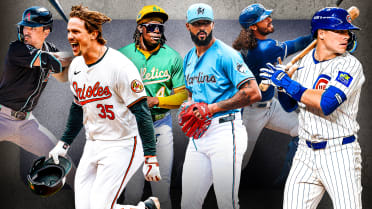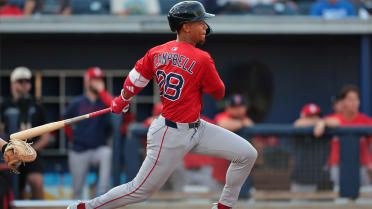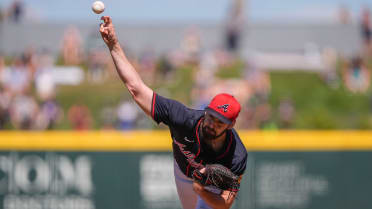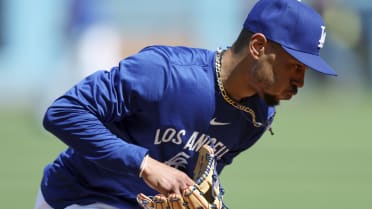There is guaranteed to be a first-time Most Valuable Player Award winner in the American League this season. Meanwhile, two of the three National League candidates are also seeking their first career MVP Award, while the other (Mookie Betts) is looking to become just the second player to be named MVP in each league.
Here's a look at the case for each MVP Award finalist before the winners are announced on MLB Network at 6 p.m. ET on Thursday:
American League
José Abreu, White Sox
Abreu, 33, is an MVP finalist for the first time in his stellar seven-year career with the White Sox. The first baseman, who agreed to a three-year, $50 million deal to stay in Chicago last offseason, topped the American League in RBIs for the second straight season, pacing all players with 60 RBIs over 60 games while finishing second in the Majors with 19 home runs and fourth in the AL with a .317 average.
He was the only AL player to rank in the top 5 in home runs, RBIs, batting average, hits (76, first), slugging percentage (.617, first), extra-base hits (34, first), total bases (148, first) and OPS (.987, fifth).
Abreu's defense also noticeably improved at first base, though he was not a Gold Glove finalist. But his value goes well beyond these impressive numbers. He is the leader of a White Sox team that qualified for the postseason for the first time since 2008, serving as a guiding force for young players ranging from Eloy Jiménez and Yoán Moncada to Tim Anderson and Luis Robert.
Abreu was in the lineup every day, driving in big runs and setting the tone for victory with efforts such as his three-homer game against the Cubs on Aug. 22 at Wrigley Field. He also drove in 17 runs in an eight-game stretch from Aug. 18-26. He's hoping to add an MVP Award to a trophy case that already includes the 2014 AL Rookie of the Year Award. -- Scott Merkin
DJ LeMahieu, Yankees
During the 2019 season, the Yankees frequently referred to LeMahieu as “The Machine,” a nickname bestowed upon the sweet-swinging infielder for his cool consistency in delivering big hits with runners in scoring position. LeMahieu took that efficiency to new heights during the shortened '20 campaign.
The Yankees’ best player two years running, LeMahieu paced the Majors with a .364 batting average (71-for-195), marking his second career batting title. Paired with the NL batting title he won with the Rockies in 2016, LeMahieu is the only player in the Modern Era (since 1900) to claim a hitting title in each league.
A three-time Gold Glove Award winner at second base, LeMahieu continued to be a stellar defender, solidifying the Yankees' infield while appearing at three positions.
“If you add up the last two years in Major League Baseball, he's on the short list of short lists for being the best player in the sport -- he's been that impactful,” Yankees manager Aaron Boone said. “In the biggest moments, he always seems to deliver. He's just been a great player for us.” -- Bryan Hoch
José Ramírez, Indians
The Indians haven’t had an MVP Award winner since third baseman Al Rosen in 1953, but Ramírez is no stranger to being a candidate for the award. This is the third time Ramírez has placed in the top 3 in MVP voting over the past four seasons -- the most top-3 finishes of all Major League players during that span.
Ramírez had the Tribe’s best offensive year, hitting .292 with a career-best .993 OPS, 17 homers, 46 RBIs and 16 doubles in 58 games. He had a quieter August due to a thumb injury, but he almost single-handedly pulled the Indians out of an eight-game losing streak in the middle of September and helped them end the season with nine wins in their final 11 games.
The 28-year-old really thrust himself into the spotlight over the final two weeks of the 2020 regular season. In September, he hit .366 with a 1.294 OPS, an .841 slugging percentage, 10 home runs, 24 RBIs and nine doubles. Ramírez shot to the top of the fWAR leaderboard (3.4) by the end of the year, tying Freddie Freeman for the highest mark in the Majors.
Ramírez's 17 home runs also tied Mike Trout and Fernando Tatis Jr. for the fourth most in MLB, while his 46 RBIs tied Trout for sixth across the Majors. -- Mandy Bell
National League
Mookie Betts, Dodgers
The newcomer’s Spring Training address to the team challenged work ethic and set an intense tone that carried through to a World Series title. It was Kirk Gibson 32 years ago and Mookie Betts in 2020.
Betts brought five tools to the field, impacted outcomes in ways not even imaginable and made every player around him better. While some stars crumble in new surroundings after blockbuster trades and landmark contracts, Betts somehow exceeded sky-high expectations.
Who does that?
Betts ranked among the NL leaders in hits (64, T-10th), runs (47, fourth), stolen bases (10, T-5th) and homers (16, T-3rd). He went 18-for-41 (.439) with runners in scoring position, the third-best mark in the Majors, and he was at his best late in games, posting a .343/.370/.643 line from the seventh inning onward. He led the league in bWAR (3.4).
The 2018 AL MVP had a .302/.383/.570 line out of the leadoff spot, and when he batted first, the Dodgers posted a 33-9 record. The Dodgers went 31-5 when Betts scored a run. On Aug. 13, he homered three times against the Padres, joining Hall of Famer Johnny Mize and Sammy Sosa as the only players in MLB history with six career three-homer games.
Defensively, Betts was spectacular, making difficult catches look easy, showing off his power arm when runners tested him and cutting off balls to prevent extra bases. He finished second in the league in defensive runs saved. Perhaps his greatest baseball skill is baserunning -- not just stealing bases, but his instinctive ability to advance on balls in the dirt, contact plays and fielders’ missteps. Winning this year would make Betts, the 2018 AL MVP, only the second player in history to be an MVP in each league, joining Frank Robinson. -- Ken Gurnick
Freddie Freeman, Braves
Along with producing 3.4 fWAR (tied with Ramírez for the most in MLB), Freeman led the NL with 51 runs scored and ranked second in batting average (.341), on-base percentage (.462), slugging percentage (.640) and OPS (1.102). The only player to finish ahead of him in each of those four categories was Juan Soto, who logged just 196 plate appearances (66 fewer than Freeman during the shortened season).
As the Braves rolled to a third consecutive NL East title, they were once again led by Freeman, who missed most of Summer Camp while recovering from COVID-19.
The four-time All-Star slumbered through the regular season’s first couple weeks before hitting .384 with 11 homers and an MLB-best 1.220 OPS from Aug. 9 through the end of the regular season.
One of Braves manager Brian Snitker’s best in-season alterations this year was to move Freeman to the No. 2 spot and place Marcell Ozuna in the three hole.
Freeman hit .390 with a 1.202 OPS when batting second. His production enhanced the production of Ozuna, who hit .375 with a 1.182 OPS when batting third. -- Mark Bowman
Manny Machado, Padres
Two offseasons ago, the Padres paid an MVP price for one of the game’s top third basemen, landing Machado on a franchise-record 10-year contract. In his second season in San Diego, Machado lived up to the billing -- and then some.
Fernando Tatis Jr. may have been the face of the Padres' 2020 turnaround, but throughout San Diego's run to its first postseason appearance in 14 years, no one was steadier than Machado. No Padre was more consistently excellent. Perhaps no player in baseball was.
Machado raked from start to finish, posting a .304/.370/.580 slash line -- all career highs. His 16 homers were tied for third in the NL. He got particularly hot in mid-August, taking home consecutive NL Player of the Week honors and hitting a pair of dramatic grand slams, including a walk-off against the Rangers.
On the surface, Machado's offensive numbers don't quite match those of Freeman. But that's where his defensive value comes into play. On top of his bat, Machado played his usual outstanding third base -- with an added twist this year. The Padres used Machado as their short-right fielder in the shift, and some of his most spectacular plays came from the right side. (That includes one of the season's top defensive highlights, when Machado made an absurd over-the-shoulder running grab in the right-field corner in Texas.)
On an excitable roster brimming with youth and inexperience, Machado was a steady presence and a driving force. His value was as apparent in the win column as it was in his own gaudy numbers.
In short, Machado was everything the Padres hoped he'd be when he put pen to paper. -- AJ Cassavell



